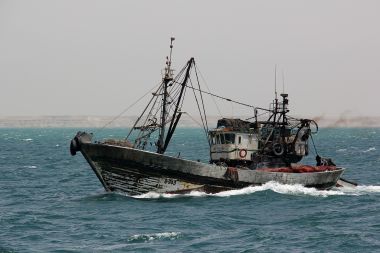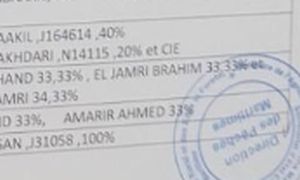
New documentation shows that only 4 out of 75 purse seiners that the Moroccan government have licenced to fish on the pelagic stocks off Dakhla, occupied Western Sahara, are controlled by Saharawis.

Western Sahara Resource Watch (WSRW) has obtained a new list of coastal purse seiners licensed by the Moroccan authorities to fish the pelagic stocks off Dakhla, occupied Western Sahara.
The list is entitled "liste des senneurs côtiers autorisés à accéder à la pêcherie des petits pélagiques à partir de Dakhla au titre de la campagne de pêche 2018" - which translates to "list of coastal purse seiners authorized to take part in the small pelagic fishing off Dakhla for the 2018 fishing season".
A review of the list shows that Saharawis have a stake in only four of the 75 licensed vessels (thus 5% of the total available licenses):
- The Aousserd 5, matrix 12-106, 97.83 gross tonnage, is part owned by Mohamed El Amine Daiedda, who is Saharawi. Daiedda has a 34% share in the vessel.
- The Boulanwar, 12-96, with a gross tonnage of 129.95 is 100% owned by a Saharawi, called Sidi Sloh El Jomani.
- The Jawharat el Bahr, 6/1-223, with a gross tonnage of 108.41, is part owned by a Saharawi: M'barek Hammia holds 35% ownership of the vessel.
- The Mabrouk 3, 8-743, with a gross tonnage of 78.71, is fully owned by Zinni Bray, who is Saharawi.
The remaining 71 licensed vessels are all owned by Moroccans: most own a single vessel, though a few Moroccan families have obtained multiple licenses (e.g. the El Habza family, the Gourti and the Id Benjaa) for different boats. The vessel Billlal 3, in the top image is one of the 71 such boats controlled by a Moroccan

Dakhla is a fishing town located along the mid-coast of Western Sahara: the last colony in Africa. Morocco brutally invaded the territory in 1975 and went on to annex large parts of it - in spite of a clear opinion by the International Court of Justice refuting Morocco's claims to the territory, and hundreds of UN Resolutions calling for the Saharawi people's right to self-determination. Dakhla was occupied by Morocco in 1979, as Mauritanian occupying forces departed the Southern parts of Western Sahara. The UN General Assembly reacted to the Moroccan invasion of Dakhla by stating that it "deeply deplores the aggravation of the situation resulting from the continued occupation of Western Sahara by Morocco and the extension of that occupation to the territory recently evacuated by Mauritania", urging Morocco to "join the peace process and to terminate the occupation of the territory of Western Sahara" (UNGA resolution 34/37).
Earlier this year, the European Court of Justice invalidated the EU-Morocco Fisheries Partnership Agreement's application in Western Sahara, stating that Morocco has no sovereignty or jurisdiction over the territory. Just last week, the Court reiterated its position in a case against the EU-Morocco fish deal brought by the Polisario Front, the Western Sahara liberation movement.
The Court repeated the findings of the ICJ - that Morocco has no sovereignty over Western Sahara. The EU institutions and Morocco have repeatedly stressed that trade in Western Sahara benefits the locals, but without clarifying whom those locals are. The CJEU judgment from 2016 was clear in its article 106 that the entire question of alleged 'benefits' to Western Sahara was not relevant when assessing the legality of EU-Moroccan operations in Western Sahara, but that such trade must first obtain the consent of the representatives of the territory.
International human rights NGOs and several UN bodies have all described Western Sahara as a human rights dark spot. Basic human rights violations are rampant, and the social and economic discrimination of Saharawis by the Moroccan authorities are well documented, e.g. by UN Special Rapporteur on the right to food Hilal Elver who visited Dakhla. In her end-of-mission statement, Elver noted that the people of Western Sahara were not equally benefitting from the economic projects that Morocco was undertaking in the territory.
Those findings are once again supported by the list of fishing licenses obtained by WSRW.
The total gross tonnage of this Moroccan fleet that is authorised to fish off Dakhla is 6,989.25 tonnes. The vessels that are owned or part-owned by Saharawis have a total of 279.87 tonnes - or 4% of the total gross tonnage. Gross tonnage is a measure describing a vessel's internal volume, i.e. how much tonnes of fish it can carry.
All vessels in the list are seiners - a vessel using a method of fishing that employs a fishing net called a seine, that hangs vertically in the water with its bottom edge held down by weights and its top edge buoyed by floats. The vessels are authorised to fish the small pelagic stocks of Dakhla such as herrings and sardines.
Western Sahara propaganda website removed
Kosmos Energy has finally taken down a website that was set up to embellish its oil and gas exploration offshore Western Sahara.
SRI update
The following overview enlists stock-exchange registered companies with current or recent operations in occupied Western Sahara. Updated 9 March 2025.
VINCI reportedly involved in Minister's wind farm on occupied land
The French multinational will not respond to questions about its potential stake in a wind energy project in occupied Western Sahara in partnership with the Moroccan prime minister.
UAE billions to controversial hydrogen project on occupied land
The Belgian-related UAE company Dahamco is to invest several billion dollars in a highly problematic energy project on occupied territory.


